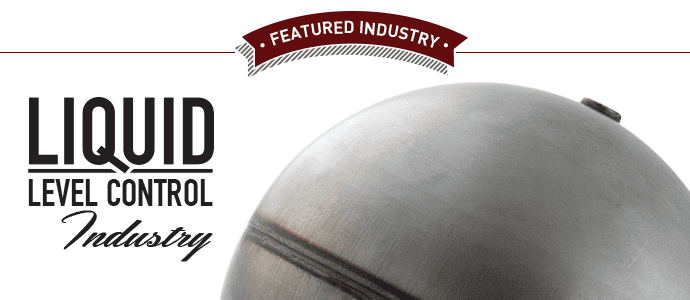 Arthur Harris stainless steel float balls have become standard equipment in industry applications where strength, maximum corrosion resistance, and superior buoyancy are necessary. These unique qualities make them the optimal choice for industries that require liquid level control for facility safety, substance measurement, and even to control switches. Steel floats are ideal under high-pressure conditions and at correspondingly high temperatures in water or corrosive liquids. Our stainless steel floats (most popular types are manufactured in 304 or 316 stainless steel) maintain high strength at temperatures up to 800° F (427° C), while their relatively lighter wall thicknesses provide increased buoyancy. While many industry applications require liquid level control, it’s worth examining the very different ways which these versatile float balls can be used.
Arthur Harris stainless steel float balls have become standard equipment in industry applications where strength, maximum corrosion resistance, and superior buoyancy are necessary. These unique qualities make them the optimal choice for industries that require liquid level control for facility safety, substance measurement, and even to control switches. Steel floats are ideal under high-pressure conditions and at correspondingly high temperatures in water or corrosive liquids. Our stainless steel floats (most popular types are manufactured in 304 or 316 stainless steel) maintain high strength at temperatures up to 800° F (427° C), while their relatively lighter wall thicknesses provide increased buoyancy. While many industry applications require liquid level control, it’s worth examining the very different ways which these versatile float balls can be used.
Food Processing
In facilities that process and prepare food, large tanks of liquid ingredients are most easily managed with the use of stainless steel float balls which indicate the amount of each substance still remaining in its vat. While these ingredients combine to form edible food and beverage products, in their pure form they are extremely acidic or alkaline, which would contribute to the swift corrosion of lower quality float balls. Liquid ingredients like citric acid, concentrated citrus juices, vinegar, and dairy are frequently used in food processing but are highly corrosive in their pure form. The thin wall construction and corrosion resistant stainless steel material of Arthur Harris float balls provide optimal flotation without the risk of reactions between the ball material and the substance in which it floats.
In addition to corrosion, high pressure is another condition presented by the food processing industry. Pressure changes are caused by the heating of food components for the purpose of mixing, concentrating, or cooking. As these substances change temperature or maintain a constant high temperature and yield steam, the pressure inside the tank or vessel changes, creating an environment which would damage float balls made from weaker materials. Depending on the range of pressure, differing wall thicknesses of stainless steel will be required in order for the float ball to maintain its structure and buoyancy.
Chemical
In chemical processing and storage facilities, high-quality liquid level control devices like float balls are an integral part of maintaining the safety of the facility as well as ensuring the correct viscosity and composition of a large amount of chemicals. Although each chemical presents a different set of properties which could contribute to corrosion, oxidation, or complete dissolution of lesser materials, the strong stainless steel walls of Arthur Harris float balls allow chemical engineers to monitor each chemical with confidence.
In chemical process engineering, chemicals are heated, cooled, and mixed; all of which alter the chemical’s effects on anything in contact with it. Since liquid level control devices are subjected to constant exposure, they must also be able to stand up to changing temperature, levels of corrosivity, and potentially turbulence depending on how the chemical is mixed. Arthur Harris stainless steel float balls are designed to withstand extreme temperatures, resist corrosion, and remain durable and buoyant even when subjected to changing conditions.
Vacuum Trucks
Trucks with hollow tanks used for transporting liquids including water, sewage, chemicals, and other liquids require liquid level control devices to act as a shutoff, indicating that the tank has reached its limit and is full. Since Arthur Harris stainless steel float balls are so buoyant, they are an optimal primary shutoff for the suction line of pneumatically loaded tanks filled with liquids ranging in thickness from water to sludge. To prevent over-filling, the float ball rises to the top of the truck’s tank when full, triggering the switch to prevent the vacuum hose from taking in any more liquid.
Like its applications in other industries, the float ball used in vacuum trucks must be just as resistant to corrosion, temperature changes, and durable enough to withstand the constant motion of liquid in a moving vehicle and contact with the vessel walls. Stainless steel float balls from Arthur Harris are designed to maintain their superior durability and strength in all of these conditions and more, making them a top choice for all vacuum and tank truck applications.
Order Stainless Steel Float Balls From Arthur Harris
At Arthur Harris, we design the highest quality liquid level control devices available on the market. We have experience designing custom float balls for the unique requirements of applications in various industries and we’re always ready for a challenge. Simply provide us with your requirements, including the size of the float needed, material, gauge or thickness, connection or thread size, and quantity. The majority of the items we produce are made to our client’s specifications and can be sent to us in the form of blueprints. We look forward to designing the ideal device for your unique needs. Request a quote today!




